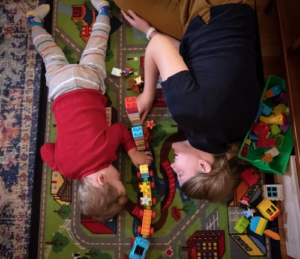 Here’s a resource from NPR’s Life Kit: Tools to Help You Get It Together . . . and can’t we all use a few more of those in our toolbox? The Five-Minute Daily Playtime Ritual centers around engaging a child “in short, daily sessions of child-led play.” Developed in the 1970s, by psychologist Dr. Sheila Eyberg, as part of Parent-Child Interaction Therapy (PCIT), this recommendation for following a child’s lead during play is now commonplace in early intervention and other corners of early childhood education. The PCIT approach itself requires considerable specific training. However, the research-based concepts, summed up in the acronym P.R.I.D.E. (i.e., Praise-Reflect-Imitate-Describe-Enthusiasm), can help most parents connect with their young children. Put away the questions, commands, and directions! Dive headfirst into the child’s world by attending to and building upon what is capturing their attention. Focus on imagination and creativity rather than rules and playing the right way. Enjoy your time together and repeat it as often as you’d like. Check out The Five-Minute Daily Playtime Ritual. You’ll be glad you did!
Here’s a resource from NPR’s Life Kit: Tools to Help You Get It Together . . . and can’t we all use a few more of those in our toolbox? The Five-Minute Daily Playtime Ritual centers around engaging a child “in short, daily sessions of child-led play.” Developed in the 1970s, by psychologist Dr. Sheila Eyberg, as part of Parent-Child Interaction Therapy (PCIT), this recommendation for following a child’s lead during play is now commonplace in early intervention and other corners of early childhood education. The PCIT approach itself requires considerable specific training. However, the research-based concepts, summed up in the acronym P.R.I.D.E. (i.e., Praise-Reflect-Imitate-Describe-Enthusiasm), can help most parents connect with their young children. Put away the questions, commands, and directions! Dive headfirst into the child’s world by attending to and building upon what is capturing their attention. Focus on imagination and creativity rather than rules and playing the right way. Enjoy your time together and repeat it as often as you’d like. Check out The Five-Minute Daily Playtime Ritual. You’ll be glad you did!
The ICC-Recommended Early Start Personnel Manual (ESPM) describes core knowledge and role-specific competencies needed for early intervention service provision, incorporating current research and evidence in the field of early intervention. To access the ESPM, click here.
This resource is related to the following ESPM knowledge-level competencies:
- Core Knowledge (CK):
- CK2: The role of primary social and emotional relationships as the foundation for early learning.
- CK5: The importance of play as context, method, and outcome of learning.
- Individualized Family Service Plan Development and Review (IFSP-DR):
- IFSP-DR5 (EIS): Understands the rationale for the identification and selection of intervention strategies used in everyday routines, relationships, activities, places, and partnerships for early intervention activities.
- Individualized Family Service Plan Development and Review (IFSP-i):
- IFSP-i2 (EIS): Understands the individual nature of child learning styles and the importance of adapting intervention strategies.
- IFSP-i3 (EIS): Knows generic and specific evidence-based early intervention strategies to support all areas of development.
- IFSP-i6 (EIS): Understands the need for developmentally appropriate strategies, adaptations, assistive technologies, and other supports that maximize the child’s learning opportunities.
- IFSP-i11 (EIS): Knows strategies that support parents in adapting the natural environment to
